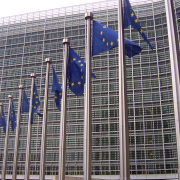What are chlorpyrifos and chlorpyrifos-methyl?
Chlorpyrifos (sometimes referred to as chlorpyrifos-ethyl) and chlorpyrifos-methyl are insecticides used to control insect pests on a range of crops. Chlorpyrifos-methyl is also used to treat stored cereal grain and empty warehouses.
What is the current status of chlorpyrifos and chlorpyrifos-methyl in the EU?
On 6 December 2019, at the meeting of the Standing Committee on Plants, Animals, Food and Feed (PAFF Committee) the Member States voted on two draft Implementing Regulations proposing to not renew the approvals of chlorpyrifos and chlorpyrifos-methyl.
For both substances, a qualified majority was reached.
The European Commission formally adopted the Regulations on 10 January 2020, meaning that Member States must, within one month, withdraw all authorisations for plant protection products containing the active substances.
A short period of grace for final storage, disposal and use (maximum 3 months) may be granted by the Member States. After that, such plant protection products can no longer be placed on the market or used in the EU.
Why did the Commission propose not to renew the approvals?
In April 2019, as part of the standard regulatory renewal of approval processes for these substances, experts from EFSA and Member States convened to discuss the human health assessment of chlorpyrifos and chlorpyrifos-methyl. Experts concluded that concerns related to human health exist, in particular in relation to possible genotoxicity and developmental neurotoxicity.
In the light of these concerns and given the delays with the environmental risk assessment, the Commission mandated EFSA to provide statements on the main findings on human health for chlorpyrifos and chlorpyrifos-methyl.
On 2 August 2019, EFSA published statements for both substances, confirming that concerns for human health have been identified and that safe levels of exposure cannot be determined based on the available data. EFSA concluded that the approval criteria for human health laid down in the EU legislation are not met.
A second expert discussion on chlorpyrifos-methyl took place in early September 2019. On 26 November 2019, EFSA published its updated statement on chlorpyrifos-methyl, which confirmed the earlier findings.
The Commission has and will continue to remove active substances from the market for which it cannot be demonstrated that the approval criteria enshrined in the legislation are satisfied.
What about the maximum residue levels (MRLs) in food?
The Commission is already discussing with the Member States a draft Regulation to lower the Maximum Residue Levels (MRLs) of chlorpyrifos and chlorpyrifos-methyl in food and feed to the lowest level that can be measured by analytical laboratories.
A vote on this draft Regulation is expected to occur in February 2020.
Source: Agropages


